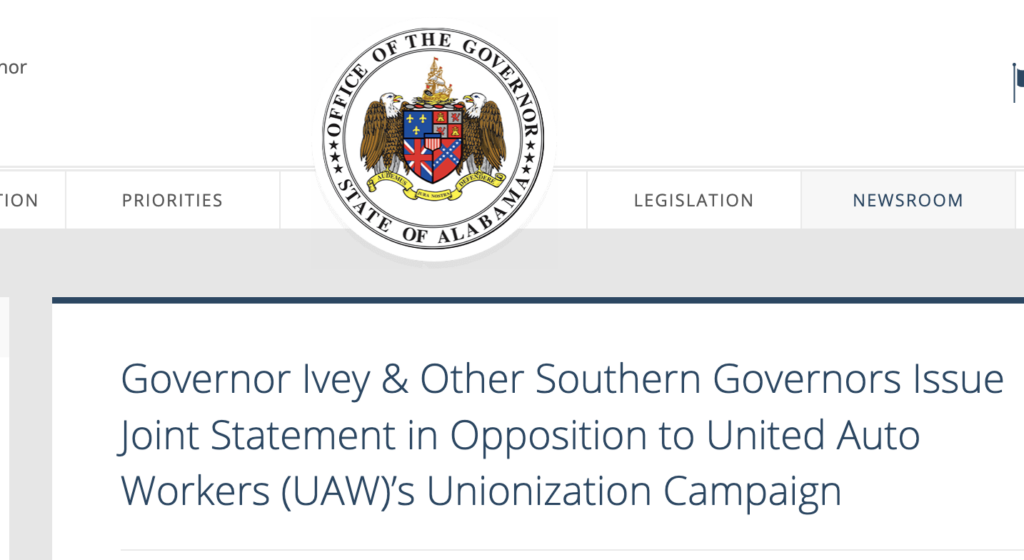Republican governors lash out against organized labor

Let’s check in on the new, populist, working-class Republican Party:
The U.A.W. is targeting 13 automakers — including Toyota, Hyundai, Honda, Nissan, Volvo and Tesla — employing around 150,000 workers in 36 nonunion plants across the South. It faced the first major test of its strategy on Wednesday, when 4,300 workers at a Volkswagen factory in Chattanooga, Tenn., began voting on whether to unionize. The vote ends on Friday. If it’s successful, it will be a breakthrough for a labor movement that has struggled to build a footing in the South.
The mere potential for union success was so threatening that the day before the vote began, several of the Southern Republican governors announced their opposition to the U.A.W. campaign. “We the governors of Alabama, Georgia, Mississippi, South Carolina, Tennessee and Texas are highly concerned about the unionization campaign driven by misinformation and scare tactics that the U.A.W. has brought into our states,” their joint statement reads. “As governors, we have a responsibility to our constituents to speak up when we see special interests looking to come into our state and threaten our jobs and the values we live by.”
This is inevitable, not only because opposition to the interests of workers is foundational to both the Republican Party and the traditional political economy of the South:
The history of Southern political economy is to a great extent a history of the unbreakable addiction of Southern political and economic elites to no-wage and low-wage labor. Before the Civil War, of course, this meant slavery. And where the peculiar institution was most lucrative, an ideology grew from the soil of the cotton and rice fields and sugar plantations, one that elevated human bondage as the only solid foundation of a stable society.
“In all social systems there must be a class to do the menial duties, to perform the drudgery of life,” Senator James Henry Hammond of South Carolina declared in an 1858 speech. “It constitutes the very mudsill of society and of political government, and you might as well attempt to build a house in the air, as to build either the one or the other, except on this mudsill.”
A decade later and the slave system was dead, crushed underfoot by the armies of emancipation. The landowning Southern elites had lost their greatest asset — a seemingly inexhaustible supply of free labor. They would never regain it, but they would fight as hard as they could to approximate it.
[…]
It was in defense of this world that Southern political and economic elites bitterly resisted organized labor as it grew by leaps and bounds in the 1930s, backed by Franklin Roosevelt, Robert Wagner and the National Labor Relations Act. It was in defense of this world that those same elites fought, successfully, to derail the Congress of Industrial Organizations’ postwar effort to organize the South, Operation Dixie.
It was in defense of this world, as the historian Katherine Rye Jewell points out in “Dollars for Dixie: Business and the Transformation of Conservatism in the Twentieth Century,” that Southern elites fashioned cultural traditionalism, anti-New Dealism and free market ideology into a new mantra of “free enterprise.” It was meant to stand athwart a supposed movement “away from individual responsibility, states’ rights and local and community self-government,” in the words of the Southern States Industrial Council, a business group organized in opposition to Roosevelt’s vision for the country.
Opposition to labor is as constitutive of the neoconfederate politics that dominate the contemporary Republican Party as white supremacy.


